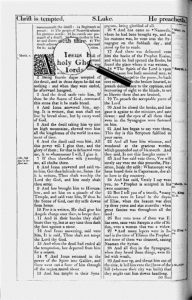

In the days of John the Baptist and the Son of God, the preserved language of the devout Jews was Hebrew. So when the angel Gabriel brought the good news to the Hebrew virgin, Miriam (or Mary in English), that she would give birth to the Savior of the world, and told her what His name would be, what language do you suppose he spoke? Hebrew, of course! And certainly Miriam and Yoceph (or Joseph in English) named the child just as the angel had commanded them — Yahshua.
In Matthew 1:21, your Bible probably reads, “… and you shall call His name Jesus, for He will save His people from their sins.” But the name Jesus is a modern English adaptation of the Greek name, Iesous, which is itself a corruption of the original Hebrew name Yahshua. The name Jesus or Iesous has no meaning of its own, but the Hebrew name Yahshua literally means Yahweh’s Salvation,1Yah is the personal name of God, and shua is from a Hebrew root word that means “to save.” God identified Himself to Moses as YAH (meaning “I AM”) in Exodus 3:14, as in Psalm 68:4, KJV
(“…by his name Jah”), and as most familiar in the Hebrew word Hallelujah (“Praise Yah”). And in John 5:43 and 17:11, Yahshua says that He came in His Father’s name, “the name which You have given Me” (NASB), so it is not surprising that the Father’s name would be incorporated into the Son’s name, Yahshua. which makes sense out of the angel’s message in Matthew 1:21, “…you shall call His name Yahshua [Yahweh’s Salvation], for He shall save His people from their sins.”
If you look in an old King James Bible, you will find the name Jesus in these two passages:
Which also our fathers that came after brought in with Jesus into the possession of the Gentiles, whom God drave out before the face of our fathers, unto the days of David… (Acts 7:45, KJV)
For if Jesus had given them rest, then would he not afterward have spoken of another day. (Hebrews 4:8, KJV)
However, if you look in any modern translation of the Bible, including the New King James Version, you will find that in place of the name Jesus, the translators use the name Joshua, for in the context it is clear that it is speaking there of Moses’ successor and not the Son of God. But in the underlying Greek manuscript, the name in both of these verses is — Iesous.
You see, Joshua is the common English transliteration2transliteration — expressing words of a language by using the characters of another alphabet of the Hebrew name Yahshua. Joshua of the Old Testament had the same name as the One called Jesus in the New Testament, for Joshua was the prophetic forerunner of the Son of God, bringing Israel into the Promised Land and leading them to victory over their enemies. But since the translators obviously know this fact, why do they only translate Iesous as Joshua in these two verses, and as Jesus everywhere else?
The NIV New Testament even has a footnote supporting this fact under Matthew 1:21: “Jesus is the Greek form of Joshua.”

A page from the 1611 Authorized Version (King James Bible). Note the lack of a “J” in the Savior’s name.
The fact is, the name of God’s Son could not even be pronounced as “Jesus” in English until late in the 16th century, simply because there was no “J” sound or letter in English until then.3Compact Edition of the Oxford English Dictionary (Oxford University Press, 1971), pp. 1496,1507 The modern letter “J” developed from the letter “I” which began to be written with a “tail” when it appeared as the first letter in a capitalized word. So in old English the name now written as Jesus was actually written and pronounced much like the original Greek Iesous. Eventually the hard “J” sound crept into the English language to accompany the different way of writing the initial “I” in the name.
You may also find it interesting that in Acts 26:14-15, it says that the apostle Paul heard the name of the Son of God pronounced “in the Hebrew tongue” by the Son of God Himself. Paul certainly didn’t hear the Greek name Iesous or the English name Jesus, but rather the Hebrew name, the name above all names, Yahshua.4Philippians 2:9; Acts 4:12
Scriptural References and Other Footnotes





